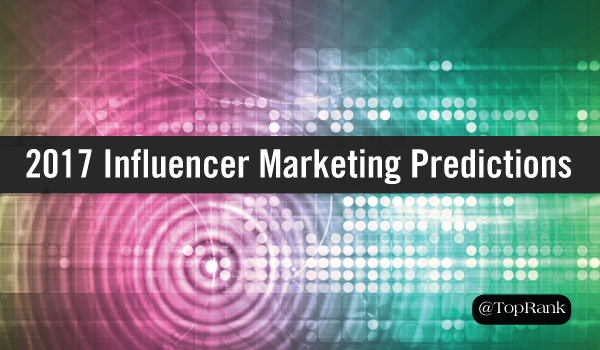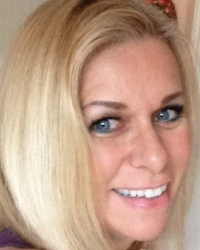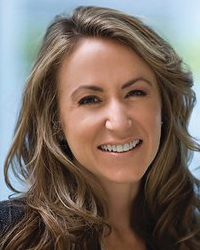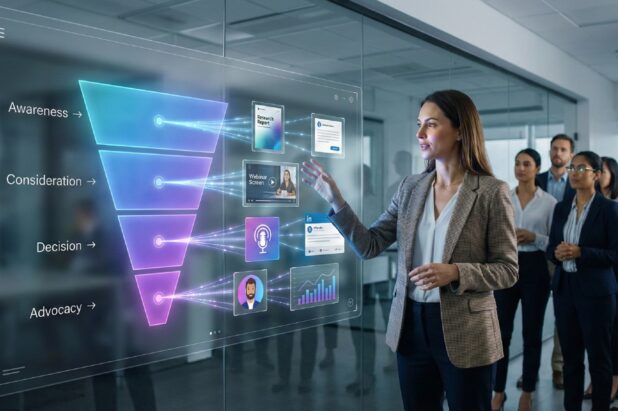
The buyer journey has changed, and will only continue to evolve. Clean funnels that marketers used to use to determine their digital marketing strategy are a thing of the past.
Today’s consumers can take many different paths (at their own pace) to discover the products and solutions that work best for them. This can create a lot of unpredictability for marketers struggling to keep their head above water.
For marketers trying to do more with less, or connect in a more meaningful way, influencer marketing can be an extremely effective method.
Influencer Marketing is the practice of developing relationships with connected internal and industry experts to co-create content of mutual value to achieve measurable business goals.” – TopRank Marketing
To help marketers see what is on the horizon for influencer marketing in 2017, we tapped into some of today’s leading experts. Their predictions are included below.
Experts Share Their Top Predictions for 2017
Amisha Gandhi

Senior Director, Influencer Marketing – SAP
@AmishaGandhi
I think the trend and the importance of micro-influencers will increase in 2017, but more importantly – companies/brands will look to the business results they can drive with their influencer programs versus awareness and reach. Specifically, in B2B influencer marketing, we will see companies plan campaigns that include influencer content and offers that help both lead-gen and demand-gen in the customer journey. For, 2017 influencer marketing 1) will prove its value through concrete ROI and pipeline touch – through influencer-led content and marketing offers (eBooks, videos, etc) 2) due the rise of mobile first content, marketers need to deliver “snackable” content that is easy to consume and share (example: mini video series vs. longer corporate driven videos) 3) rise of influencers who can drive purchases vs. awareness – continuing the trend of the micro-influencer model.
Lee Odden

CEO – TopRank Marketing
@leeodden
Influence ubiquity – While a very small percentage of influencers account for the majority of influence and content with reach, I think creator platforms and influencer marketing platforms will evolve in 2017 to help make “everybody is influential about something” a reality. Individuals as niche influencers will be more empowered than ever to connect with brands seeking micro-audiences at scale. A more participative approach to content at scale will completely change the game of influencer marketing that is focused almost entirely on top tier influencers.
Tim Williams

CEO, Onalytica
@williamstim
2017 is the year when Influencer Marketing will become embedded into Marketing & Communication activities. Brands need to be more agile and align their messages and content with what the influencer community really cares about. They need to invest in training internal subject matter experts to connect with the influencer community both offline and online to win over the key influencers. Authenticity and credibility as well as engaging content will be pivotal to successful engagement to improve brand perception and trust with consumers.
Pierre-Loic Assayag

CEO – Traackr
@pierreloic
2017 will be the year we end the confusion of what influencer marketing is and how to succeed in it. We’re already seeing many brands, both B2B and B2C, taking a critical look at their influencer marketing investments and setting up measurement frameworks to evaluate their initiatives. In 2017, these brands will make data-driven strategic decisions on their investments (and divestments) in influencer marketing. This will trigger the roll out of business processes and governance guidelines on the practice. My prediction is that the normalization of influencer marketing in 2017 will lead to massive scaling of the practice in 2018.
Konnie Brown

Leading Corporate Social & University Influencer Relations – Dell
@Konstanze
After experimenting with influencer marketing for a few years now, brands are still at varying degrees of maturity and influencers are increasingly selective and savvy of how to work with brands. One thing is clear, however, if there is no mutual value creation, influencer marketing will fail.
2017 will be the year of brand and influencer content co-creation that is sincere, meaningful and valuable for both parties and helpful to the consumer. My prediction for large B2B brands is that the often failed attempts of brand publishing on owned properties (as an extension of marketing) will evolve into a much more sincere digital content co-creation between brands and influencers.
Key factors will be a brand’s focus on customer experience, in this case in brand publishing, and much improved understanding of building long-term, human-to-human influencer relationships. Emerging brain research on digital story processing and improved social analytics capabilities will play a key role as well.
Douglas Dawson

General Manager, Influencer Relations – Microsoft
@theDougDawson
We have already seen the power of authenticity when it comes to working with influencers and I think next year will continued to be focused on that. That being said, I think the most successful and impactful partnership moments will be the unexpected, creative ones you might not see coming.
Kristin Hersant

VP of Marketing – Linqia
@kristinhersant
Linqia’s The State of Influencer Marketing 2017 survey of 170 B2C marketers found that influencer marketing program budgets are set to double in 2017. 94% of marketers who used influencer marketing in 2016 found the channel to be effective and yet 78% cite determining the ROI of influencer marketing as their top challenge. Linqia predicts that 2017 will be the year that influencer marketing becomes accountable. Through new technologies, marketers will finally tie spend through to performance, driving a shift in ownership from PR to advertising budgets as influencer marketing becomes a key part of the media mix.
Take Your Time & Build Meaningful Relationships
Inevitably, a successful influencer marketing strategy relies heavily on your brand’s ability to build meaningful relationships and create mutual value for your influencers. If you have recently started to incorporate influencers into your marketing strategy or have been working with influencers of an extended period of time, what do you think are the most important characteristics of a successful influencer marketing program?
Disclosure: SAP and Dell are TopRank Marketing clients.


